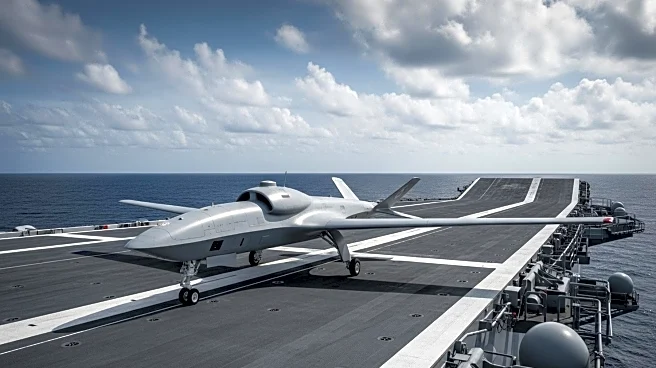What is the story about?
What's Happening?
The UK Ministry of Defence (MoD) has announced plans to test a Fixed-Wing Short Take Off and Landing Autonomous Collaborative Platform (FW STOL ACP) from a Royal Navy aircraft carrier by the end of 2027. This initiative, known as Project Vanquish, aims to explore capability and procurement options for a carrier-capable ACP that can operate within a future hybrid crewed/uncrewed carrier air wing. The announcement follows the First Sea Lord General Gwyn Jenkins' ambition to fly an ACP from a Queen Elizabeth-class aircraft carrier as early as 2026. The Maritime Aviation Transformation (MATX) strategy outlines the Royal Navy's roadmap to transition the Fleet Air Arm to a predominantly uncrewed aviation force by 2040, focusing on logistics, strike, and intelligence, surveillance, and reconnaissance (ISR) roles.
Why It's Important?
The development of autonomous collaborative platforms for naval operations represents a significant shift in military strategy, emphasizing the integration of unmanned systems into traditional defense frameworks. This transition could enhance operational efficiency, reduce human risk, and expand the capabilities of naval forces. The Royal Navy's move towards a hybrid air wing reflects broader trends in military modernization, where unmanned systems are increasingly seen as vital components of future warfare. The successful implementation of Project Vanquish could set a precedent for other nations, potentially influencing global naval strategies and defense procurement decisions.
What's Next?
The Royal Navy plans to launch the first jet-powered collaborative platform drone as a concept demonstrator from a Queen Elizabeth-class aircraft carrier by next year. This demonstration will be crucial in assessing the feasibility and effectiveness of integrating autonomous systems into naval operations. Stakeholders, including defense contractors and international military partners, will likely monitor the outcomes closely, as they could impact future collaborations and technological advancements in unmanned military systems.
Beyond the Headlines
The shift towards uncrewed aviation forces raises ethical and legal questions regarding the use of autonomous systems in military operations. Issues such as accountability, decision-making in combat scenarios, and the potential for reduced human oversight are critical considerations. Additionally, the long-term implications of this transition may include changes in military training, personnel requirements, and the evolution of international defense policies.

















